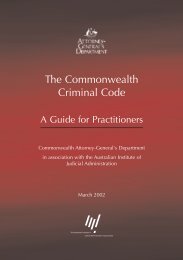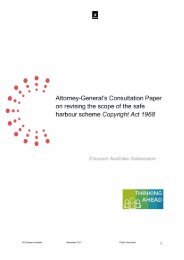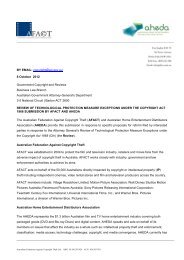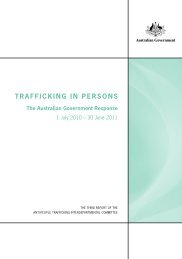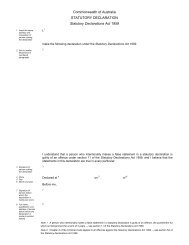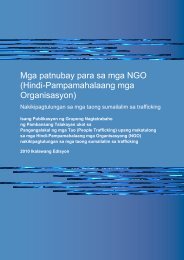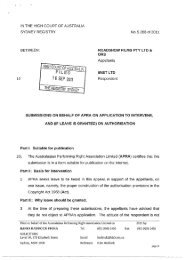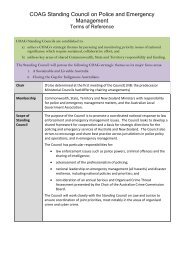Normann Witzleb [PDF 657KB] - Attorney-General's Department
Normann Witzleb [PDF 657KB] - Attorney-General's Department
Normann Witzleb [PDF 657KB] - Attorney-General's Department
You also want an ePaper? Increase the reach of your titles
YUMPU automatically turns print PDFs into web optimized ePapers that Google loves.
64 Somewhat different considerations apply in relation to proving incapacity to consent.<br />
To that extent, the NSW recommendation that the onus should lie on the plaintiff is<br />
appropriate. The well-known case of Kaye v Robertson 110 provides an illustration. In that<br />
case, the plaintiff, a well-known television personality, was recovering from brain surgery<br />
in a hospital and journalists of a tabloid newspaper entered the plaintiff’s hospital room<br />
uninvited, took photographs and published these to accompany an ‘interview’ that the<br />
plaintiff was alleged to have given to the defendants from his hospital bed. In reality, the<br />
plaintiff was not in a fit state to give or withhold consent. It would be preferable to<br />
require the defendant to plead and prove that the plaintiff consented and to put the<br />
onus on the plaintiff to establish that any consent he gave was vitiated by incapacity or<br />
other defect.<br />
65 Implied consent plays a role in a fair number of privacy cases, where a plaintiff had<br />
courted publicity but the media then make further publications which are not welcome<br />
to the plaintiff. Usually in those cases, the defendant will argue that a plaintiff invited<br />
public discussion of his or her life and therefore ‘waived’ privacy also in relation to<br />
subsequent publications. 111 However, the idea of blanket waiver for public figures has<br />
been decisively rejected by the House of Lords in Campbell v MGN Ltd. 112 Strictly<br />
speaking, these cases are not concerned with consent because the plaintiff will<br />
generally not have consented to the subsequent invasion or publication. The better<br />
argument in many cases will be that a plaintiff who fanned media interest in the past<br />
may in some circumstances have a reduced expectation of privacy. Where a person’s<br />
private life, through their voluntary revelations, has become a matter of legitimate public<br />
concern, the court will take this into account in the consideration of any countervailing<br />
public interest. In these circumstances, it becomes particularly apparent that claims of<br />
alleged consent can be difficult to separate from the wider issue of whether the plaintiff<br />
had a reasonable expectation of privacy. This confirms the view expressed above that<br />
questions of consent are best considered in the context of the cause of action.<br />
B. ‘Act or conduct was incidental to the exercise of a lawful right of defence of person<br />
or property’<br />
The Proposals<br />
66 All three proposals establish a defence for conduct that was ‘incidental’ 113 or ‘for the<br />
purpose’ 114 of lawfully defending personal or property rights.<br />
Comment<br />
110 Kaye v Robertson [1991] FSR 62.<br />
111 See, for example, Theakston v MGN Ltd [2002] EMLR 398, [2002] EWHC 137 (QB).<br />
112 Campbell v MGN Ltd [2004] 2 AC 457; [2004] UKHL 22, at [57] (Lord Hoffmann); see also Douglas v<br />
Hello! (No. 3) [2003] 3 All ER 996; [2003] EWHC 786 (Ch), at [226] (Lindsay J).<br />
113 ALRC Report, at [74-169].<br />
114 NSW Draft Bill, cl 75(1)(b).<br />
23


![Normann Witzleb [PDF 657KB] - Attorney-General's Department](https://img.yumpu.com/26247895/23/500x640/normann-witzleb-pdf-657kb-attorney-generals-department.jpg)

